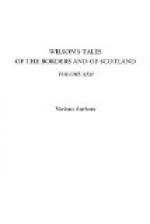“I have too much respect for religion,” replied I, “to throw a doubt on certain workings of the spirit in that mysterious condition when it hovers between the two worlds, and when it can hardly be said to belong to earth; but the case is entirely different where the common agencies are all working through their fitted and natural means. We can never say that any of those means are superseded—only others are substituted; and we do not understand the substitution.”
“You are unfortunate,” said the doctor, with a triumphant gravity. “If you admit that supernatural agencies ever have—in any stage of the world, in any place, way, or manner, or by any means—had to do with earthly things, or have to do in those days, or will have to do in any future time or place on the earth’s surface, your admission closes up your mouth for ever.”
“To do, in those days, on this night, not many hours agone!” cried Graeme, with rolling eyes. “Who cares for admissions of those who see, when one’s own eyes are nearer the brain than are the eyes or lips of him who admits, or of him who denies?”
“Not hours ago!” said the doctor, fixing his big eyes on the face of Graeme; “and so near a birth?”
“Oh, she knows nothing,” said Graeme.
“And I am supremely ignorant,” said I.
“Of what?” inquired Rogers, turning his face again to Graeme, as if he would take him into his mouth.
But just as he expected an answer, a slight rap sounded from the door. Rogers himself opened it, and found that the call was for him. Graeme and I were left again together, but not to resume the former silence.
“I did not ask you,” said he, “what you thought of the figure in the wood, for I expected nothing but a sceptical sneer. You have heard Rogers. He is a shrewd fellow, belonging to a profession not remarkable for credulity.”
“Answer me this,” said I: “Did no one know the duplicate card you used in the cheat?”
“You were present and Ruggieri, no others; did you know it?”
“No.”
“Then do you know that Ruggieri is dead in Italy? and even if he had more penetration than you, the secret died with him. But, I tell you, he could not have known. Nothing transpired at the play to show that a duplicate card was used at all, far less to show that it was a particular card.”




